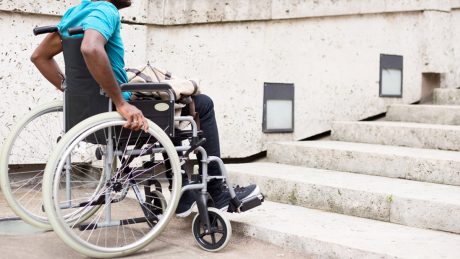To mark Disability History Month (18 November – 18 December), we have been looking at important issues affecting disabled individuals in their day-to-day lives. The theme for the month this year is: ‘Access: How far have we come? How far have we to go?’.
As part of our free Legal Service, the Pro Bono department provides advice about the help available to individuals following serious injury or illness and how these can be accessed. As a result, we see first-hand the importance of disability initiatives in supporting those living with a disability, particularly given the substantial increase in living costs often associated with this.
Unfortunately, many people are not aware of the support that may be available to them from the government, local authority and local charities. Below, we outline some of the important disability initiatives that have been introduced over the years that are aimed to support individuals living with disabilities.
Disability benefits
Personal Independence Payments (PIP)
The government introduced PIP in 2013. This is a non means-tested benefit designed to assist individuals with the extra costs that can arise from long term ill-health or disability. It was introduced to replace the Disability Living Allowance, which is the benefit still claimed by those under 16. The benefit is made up of two elements: a ‘daily living’ component and a ‘mobility’ component. Money can be awarded depending on whether an individual meets the criteria in each category. PIP is paid out at either a standard rate or an enhanced rate for each element depending on how serious an individual’s disability is.
Employment Support Allowance (ESA)
ESA has been around since 2008 and was introduced to replace Incapacity Benefit. It is designed to support individuals where their disability prevents them from working or affects how much they are able to work.
The type of ESA a person can claim depends on their circumstances. A person can claim ESA based on their income through an application for Universal Credit. This is being phased in to replace the previously named income-based ESA as part of the move to bring the majority of benefits under the umbrella of Universal Credit. Alternatively, a person can claim ESA based on their National Insurance contributions over the last two years, and this can be done online as a standalone application. This is now known as ‘new style ESA’. The calculation of National Insurance contributions (or tax credits) can be confusing, but the ESA helpline provides guidance.
Disabled Facility Grants (DFGs)
A person with a disability can obtain a grant from their local council if they need to make changes to their home to make it more manageable day-to-day.
Small adaptations are often free and local councils should pay for each adaptation that costs less than £1,000. This can include things such as grab rails, a concrete ramp or steps, and lights that come on when someone is at the front door.
However, for more expensive adaptions it is necessary to apply for a DFG. These grants are means-tested and will take into account household income and household savings over £6,000. The process of applying for the grant is dependent on the local authority, and it is best to check their website directly to start an application.
An occupational therapy assessment will usually be carried out to determine what adaptions are needed to help someone manage in their home. The kinds of things a DFG can help pay for are installing ramps, improving access to rooms and facilities and providing a more suitable heating system.
It is important to note that grants cannot be paid retrospectively once the work has been done so the application should be made first.
Access to Work Scheme
Access to Work is a publicly-funded employment support programme that aims to help more disabled people start or stay in work. It can provide both practical and financial support or a combination of both.
This may be in the form of a grant, and how much a person gets depends on their individual circumstances (importantly, it will not affect other benefits such as PIP and ESA). Under the scheme, an employer may also be responsible for some of the costs of a claim made to this scheme.
As well as a grant, the scheme can also give practical advice and guidance to employers to help them understand physical and mental ill health and how they can support employees. More information can be found here.
Other important disability initiatives:
- Transport costs for disabled children: under this scheme children may be entitled to free transport if they cannot walk to school because of their special educational needs and disabilities (SEND) or a mobility problem.
- The Blue Badge Scheme: this provides a range of parking benefits for disabled people with severe walking difficulties who travel either as drivers or as passengers. A person may also be eligible for vehicle tax exemption if they are disabled.
- The Motability Scheme: this can help with the costs of leasing a car, powered wheelchair or scooter to help a person with a disability get around. Eligibility depends on whether a person is claiming one of the disability benefits at a higher rate.
- Disabled Persons Railcard: this £20 a year travel card enables savings of a third on any rail fares where the disability eligibility criteria are met.
- Council Tax Disabled Band Reduction Scheme: this scheme provides a reduction in Council Tax if a home has certain features that are essential to a disabled person living there. Eligibility can be discussed with local councils.
- Television Licence Discount: this provides 50% off the cost of an annual TV licence if a person or someone they live with is registered as blind or severely sight impaired.
- VAT relief for disabled people: if someone is disabled or has a long-term illness, this policy means they will not be charged VAT on products designed or adapted for their personal or domestic use. This includes things such as wheelchairs or stairlifts.
Local initiatives and charities
It is important to recognise that there are hundreds of independent organisations and charities in the UK that work tirelessly to support people with disabilities both financially and beyond. Access to these can depend on where someone lives and their age/disability. It is important to investigate what local support may be available, and this can usually be done by visiting local authority websites. For example, in some areas, those who are disabled and unable to prepare their own meals may be eligible to have food delivered via the meals on wheels scheme.
Furthermore, those who have suffered a brain injury may wish to contact their local Headway group. And people who have sustained a spinal cord injury can also seek support from Back Up.
Conclusion
Important legal changes implemented by the Equality Act 2010 alongside the outlined disability initiatives provide important support for countless people living with a disability.
As disability awareness increases, particularly with regards to issues around access and inclusivity, one would hope that this will be reflected in a further expansion and strengthening of such initiatives. However, there has been reduced government spending and cuts to benefits, which some claim have hit disabled people hardest.
It remains to be seen how the government’s increased borrowing during the Covid-19 pandemic will affect future budgets and whether the benefits and funding available to people with disabilities will be further squeezed. The assistance provided by charitable organisations, themselves hit hard by the pandemic, may become all the more important. Additionally, in future, the importance of private companies and organisations developing their own disability initiatives and policies must not be underestimated.
This article was written by our Paralegal Emily Charlesworth
The Legal Service – We are here to help
The Legal Service, delivered by our pro bono team, provides patients with advice without obligation, for however long it takes to resolve the issue. Our support is available regardless of the circumstances of an accident and regardless of whether a patient has a personal injury claim.
In these difficult times, the concerns of our pro bono clients are likely to be more stark than those in more fortunate circumstances. The Legal Service will be available throughout the crisis to help in any way we can to ease the burden on our clients.
To get advice from The Legal Service, please contact Kara Smith by phone on 020 7822 8000 or by email at ksmith@stewartslaw.com.
You can find further information regarding our injury expertise, experience and team on our Personal Injury pages.
Subscribe – In order to receive our news straight to your inbox, subscribe here. Our newsletters are sent no more than once a month.







